Last night, the Senate advanced a bipartisan bill that would provide additional emergency aid to Ukraine and Israel, funding for humanitarian assistance, and support for security in the Indo-Pacific. This bill is incomplete. It would not be sufficient to ensure that security assistance is used in accordance with U.S. and international law and policy, and it would impose limits on humanitarian assistance to Palestine and impede its timely and effective delivery. However, the House version of the bill only provides for the defense of Israel. Suspending Ukraine and humanitarian aid would only undermine the United States' credibility as a partner and significantly scale back important efforts to protect democracies around the world.
The Senate package includes more than $118 billion for global security, humanitarian assistance, and border assistance. Approximately $60 billion of this will be earmarked for Ukraine's defense and economic needs. The $14.1 billion would fund security assistance to Israel. $10 billion will be provided to Ukraine, Palestine and other global humanitarian aid. and $4.83 billion to support defense needs in the Indo-Pacific. The bill would also provide $38.2 billion in funding for the U.S. defense industrial base, including replenishing submarines and weapons and ammunition transferred to partners.
Fund critical defense and humanitarian needs
These are important investments as Russia's war with Ukraine approaches its third year, Israel's continued aggression in Gaza, and China's military ambitions. There are many reasons why funding Ukraine is in the national security interest of the United States. At a time when Russia is betting on the long-lasting support of Ukraine's partners to bring its imperial plans onto its European footprint, this funding does not require the use of U.S. troops and is a strategic and cost-effective way to counter Russian aggression. Provide highly effective opportunities. This support will also be extremely important. The European Union last week approved 50 billion euros in aid, which will be provided over the next three years. Ukraine's current economic needs are great, and its military is in dire need of weapons that U.S. funding can provide.
The wars in Ukraine and Gaza have also caused a serious humanitarian crisis. The United Nations Office for the Coordination of Humanitarian Affairs (OCHA) estimates that 14.6 million people in Ukraine require access to humanitarian assistance. OCHA also reports that “almost all” of Gaza's 2.3 million people have been evacuated. Without regular access to adequate healthcare, clean drinking water, food and adequate housing, these vulnerable people are in dire need of assistance such as that provided by the humanitarian part of the Supplementary Support Package. That's what I mean.
room for improvement
Still, there is significant room for improvement in the proposed legislation. As written, the bill would waive Congressional oversight of substantial aid to Israel. The law also does not include safeguards or reporting requirements to ensure that aid is used in accordance with international law and policy. This is problematic. For months, U.S. officials have said there is no credible evidence that Israel did not take adequate precautions to avoid harm to civilians and that it used U.S.-made weapons in attacks that killed civilians. He has expressed concern that there is evidence. A growing group of senators are supporting amendments that would reinstate parliamentary notification requirements and require reporting on compliance with human rights laws and policies. Congress should ensure that these important amendments are included.
The bill's text also prohibits funding to the United Nations Relief and Works Agency (UNRWA). UNRWA is virtually the only agency capable of serving Gaza's large population in need. The United States recently suspended funding to the agency over allegations that 12 of its employees took part in the Oct. 7 attack in Israel. UNRWA has fired its staff and launched an investigation, but the issue has sparked renewed calls from some in Congress to defund UNRWA. While there may still be opportunities to deliver aid through other means, UNRWA's ban and related restrictions will undoubtedly hinder the timely and efficient delivery of aid.
conclusion
As the world's largest military and economic power, the United States has an obligation to provide for the defense of our partners, meet the basic needs of some of the world's most vulnerable people, and protect democracy from the rise of authoritarianism. There is an obligation to fulfill. . While U.S. lawmakers must fund these national security imperatives, they must also work diligently to protect oversight to ensure that the assistance provided achieves these objectives. there is.


